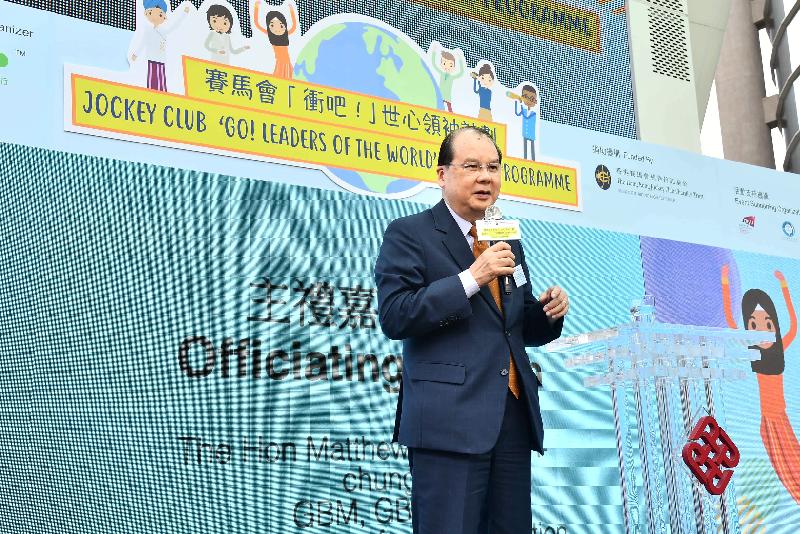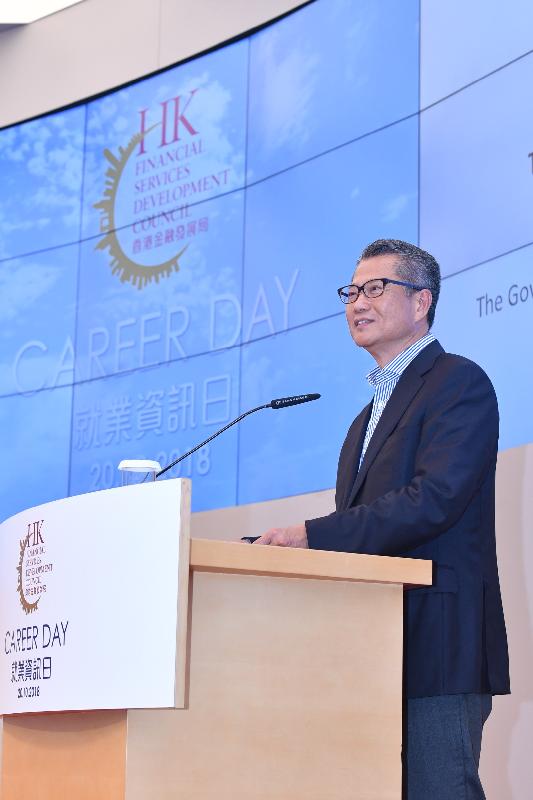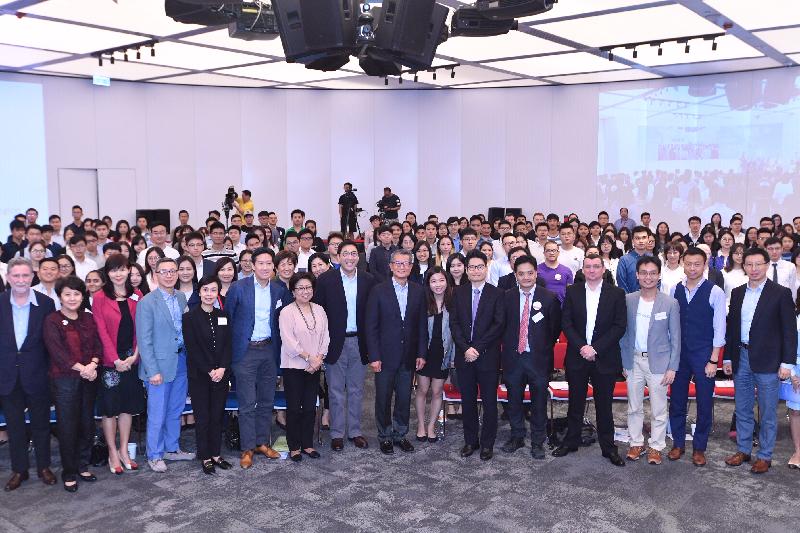Following is the speech by the Chief Secretary for Administration, Mr Matthew Cheung Kin-chung, at the Jockey Club “Go! Leaders of the World” Programme Graduation Ceremony today (October 20):
Eva (Co-founder of WEDO GLOBAL, Ms Eva Wong), Bosco (Co-founder of WEDO GLOBAL, Mr Bosco Ng), Dr Rosanna Wong (Member of Board of Stewards of the Hong Kong Jockey Club), Professor Geoffery Shen (Interim Vice President (Student Affairs) of the Hong Kong Polytechnic University), Dr Simon Shen (Founder of Glocal Learning Offices), Ms Shalini Mahtani (Founder of the Zubin Foundation), ladies and gentlemen, guests, students, principals, teachers and parents,
I was expected to speak earlier but now you have covered the points that I wanted to make, I have now decided to speak off script and talked to you from the bottom of my heart.
There was a saying that “seeing is believing”. A picture tells a story and the videos tell the full story. So you can actually see how the programme managed to really change and transform our youth, and promote successfully multi-culturalism in Hong Kong.
Let me say a few words of thanks first. I must say that I am very impressed by both Eva and Bosco and also the fact that Jockey Club’s (the Hong Kong Jockey Club Charities Trust) kind support to the programme. Without it, this project goal, the “GLOW” programme, could never take off.
I like the word “GLOW”: glow means fire and burning and that echoes pretty well the theme of the Policy Address this year. I am not hard-selling it, I am actually soft-selling it! It is “striving ahead” and also “rekindling hope”. Hope amounts to glowing. You have to keep hopes alive and hopes glowing among the young generations and among the community in Hong Kong. So my warm tribute must go to the Hong Kong Jockey Club Charities Trust for sponsoring the programme, getting it really off the ground.
PolyU (the Hong Kong Polytechnic University) of course plays a very important role. It produces two very successful social entrepreneurs, both are engineering students. They studied engineering here, not Social Sciences, not Sociology. They have amazing students and amazing products from PolyU. Also, I thank all the supporting organisations for their kind support, without which the programme, again, cannot be such a huge success.
I would like to make a few points. First of all, Hong Kong has always been a multi-cultural society where its international, cosmopolitan community is open, vibrant, colourful and diverse. But we really need to do more to promote multiculturalism in Hong Kong. Particularly, if you look at the demographics of Hong Kong at the moment, there are 265 000 non-ethnic Chinese living, working and studying in Hong Kong, just over a quarter of a million. And among them, 86 000 of them are South Asians. A lot of them were born in Hong Kong, making Hong Kong their home. We need to make sure that they integrate well into the community. I also stress, time and again, that they are part of Hong Kong. They are no different from any of us. Hong Kong is their home, a homely home. That is why we have to make sure that they are fully integrated into the community, becoming part and parcel of the whole Hong Kong community.
On that basis, because of that conviction, I have decided, during the current term of government, and have secured the support from the Chief Executive and the Financial Secretary, to have resources to achieve my dream. My dream is that I will co-ordinate government’s efforts across the whole government spectrum, including the NGOs if possible dealing with EM (ethnic minorities) in Hong Kong. I want them to work in concert to promote the true integration of EMs into the community and also to promote their upward mobility, particularly the young people – they are very important, making sure that they love Hong Kong, they feel being part of Hong Kong and contribute to the long-term development of Hong Kong. It is my objective.
I am very lucky. I managed to get what I want. In fact, the Financial Secretary promised and allocated a one-off funding of 500 million dollars to kick off the whole programme. So off my own bat I set up the Steering Committee on Ethnic Minorities Affairs in the government in order to co-ordinate holistically the government’s services across the board.
At the same time, I made a point to have dialogue and interact with all the EM concern groups, from Shalini’s to all the religious groups like Sikh and others, particularly the NGOs involved in providing EM services, education, employment, social services, and family support. You name it. I have seen everybody in the last few months. At the end, I managed to cook-up a menu. The menu has been in the public arena. You may have seen it.
This is my little pamphlet called “Strengthening Support for Ethnic Minorities” (åŠ å¼·æ”¯æ�´å°�數æ—�裔) is a very long list I tell you. You know in the end , this costs the Government 600 million dollars plus. I have exceeded the budget. But I’m sure there should be no problem at all because I manage to get the money. Now what we are going to do in a nutshell, I don’t want to keep you because you can actually see it on the website and it is also available publicly elsewhere. But I want to make sure to send you all a copy afterwards. Put it rather simply, we enhance the services across the board from education (to other areas). A good example is kindergarten. If any mainstream kindergarten from now on takes on a few EM kids, previously it’s only 8 kids you can get one additional teacher but 8 and above, no matter how many, only one additional teacher but it’s not enough. Hence, this enhanced measure: if you get one EM kid, you’ll get 8, then if you get up to 20, say 16, you’ll get 1.5. And then if you get 31, you’ll have two teachers. Under such a threshold, you have 0.5 teacher and also additional funding. So it’s calculated on a pro rata basis, it’s a 5-tiered structure.
At the same time, some kids with special education needs (SEN) kids, we also provide extra support to kindergartens and schools, across the board. Universities are encouraged and are given a funding to help schools and kindergartens with EM students as well. All these will be happening in the next school year.
Employment (is) also breaking new ground. Labour Department will take on extra staff and also work closely with NGOs and the frontline to provide case management approach for employment services. You don’t just find a job for these youngsters or find a job for the EM adult, but making sure their upward mobility, upscaling in the process so that they don’t change job every two or few weeks, hop from one job to another, there is no point. We help them find their feet in the labour market and work their way up through support, and we provide training and upscaling which we have never done before. We have also decided that rather than having a social services centre (in all districts) across the whole territory, we target to the areas with large concentration of EM residents, like Yuen Long, Shap Pat Heung, Shek Kong, Yau Tsim Mong, Kowloon City and Tung Chung as well.
The approach is that we mobilise the NGOs working through Social Welfare Department, have outreaching services directly hitting the target. They don’t have to come forward, you approach them and reach out to them. For first reason, because of cultural barriers and language barriers, very few are willing to come forward looking for services, we approach them instead. For example, under the Working Family Allowance Scheme, a typical Pakistani family, they have a big family with five or six kids. They are entitled, if the father is working full time, to $5-6000 a month from Government allowance. It is not social welfare, it’s not the Comprehensive Social Security Assistance, it’s work incentive payment to reward their hard work, self-reliance. They never apply because they don’t know how to apply. They are shy of applying because they don’t know how to approach the Government. We approach them, get them sign the form, fill in the form, they get $5-6000 a month and also tackle the problem of cross-generation poverty. This is what we are doing, really cracking difficult problems rather than skirting around the corner, really go straight to the problem, the crux of the issue.
Now I just want to give you a few examples, or else my speech would be very long. The point I want to make is, in building a caring society, an inclusive society, everyone has got a role to play. My thanks to WEDO GLOBAL for the excellent job you are doing, promoting multi-culturalism. We want our youngsters to be (future leaders with) affection for Hong Kong; to be responsible; to have international outlook; to have global perspective and of course understanding of the Mainland and national identity. At the same time, they should be inclusive, they know how to interact with people. Inclusiveness comes with interaction and working together. So I’m very impressed by the demonstration and sharing just now. It is extremely instructive and I must thank the two of PolyU student alumni and also Jockey Club again for producing a really excellent programme. I look forward to coming back again and also Eva, if you want to organise a focus group, for me to share, to meet the young people, let me know and I will find time to make sure that I’m available.
Thank you so much.







